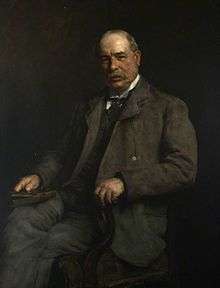William Livingstone Watson
William Livingstone Watson (Kinross, Scotland, 1835-Ayton, Perthshire, Scotland, May 1903) was a Scottish East India merchant and an astronomer.

Early life
Watson was originally intended for a career in the church but turned instead to the law and thence to business.[1] He was educated at the University of Edinburgh and the University of Glasgow.[2]
Career
Watson joined a Glasgow firm of East India merchants, James Finlay & Co., in 1855. He became a partner in this firm in 1865, and in 1876 moved to London, where he was their representative. He also participated in a number of other business activities, serving for many years as chairman of the London board of the Royal Insurance Company, and also on a number of other boards, including the Merchants’ Marine Insurance Company, the Agra Bank, the Indo-China Steam Navigation Company, the Assam_Bengal_Railway, and the Clan Line.[3]
Astronomy
In 1888 Watson bought Ayton House in Perthshire, Scotland, and with it an observatory and one of the United Kingdom's largest telescopes, the 12-inch "great refractor" that has been exhibited at the Great Exhibition in 1851. He worked on this telescope with astronomers Ludwig Becker and Ralph Copeland.[4] He was elected a fellow of the Royal Astronomical Society in 1892.[5]
Other activities
Watson was also a Justice of the Peace and a member of the Perthshire County Council.[6] He was a devout Free Church Christian and a strict Sabbatarian, banning non-religious books and children's toys on Sundays.[7] He worked with other temperance campaigners for the introduction of the Gothenburg System for controlling the consumption of alcoholic spirits.[8]
Personal life
Watson married Elizabeth Lindsay Seton, the daughter of George Seton, a genealogist and historian, in 1878, but his wife suffered from ill health after 1881, and their son R. W. Seton-Watson, the political activist and historian, later recalled that he had never seen his mother walking or standing.[9] The household was run by Watson's sister Jeanie and then by a cousin, Mary Lorimer.[10]
References
- Hanson, Susan (December 2014). "British Radicals Knowledge of, and Attitudes to Austria-Hungary 1890-1914". The Meijo Review. 15 (3): 1–76.
- "Obituary Notice: Watson, William Livingstone". Monthly Notices of the Royal Astronomical Society. 64: 295–96. 1904. doi:10.1093/mnras/64.4.295.
- "Obituary Notice: Watson, William Livingstone". Monthly Notices of the Royal Astronomical Society. 64: 295–96. 1904. doi:10.1093/mnras/64.4.295.
- Seton-Watson, Hugh; Seton-Watson, Christopher (1981). The making of a new Europe : R.W. Seton-Watson and the last years of Austria-Hungary. London: Methuen. ISBN 9780416747300.
- "Obituary Notice: Watson, William Livingstone". Monthly Notices of the Royal Astronomical Society. 64: 295–96. 1904. doi:10.1093/mnras/64.4.295.
- "Obituary Notice: Watson, William Livingstone". Monthly Notices of the Royal Astronomical Society. 64: 295–96. 1904. doi:10.1093/mnras/64.4.295.
- Seton-Watson, Hugh; Seton-Watson, Christopher (1981). The making of a new Europe : R.W. Seton-Watson and the last years of Austria-Hungary. London: Methuen. ISBN 9780416747300.
- "Obituary Notice: Watson, William Livingstone". Monthly Notices of the Royal Astronomical Society. 64: 295–96. 1904. doi:10.1093/mnras/64.4.295.
- Seton-Watson, Hugh; Seton-Watson, Christopher (1981). The making of a new Europe : R.W. Seton-Watson and the last years of Austria-Hungary. London: Methuen. ISBN 9780416747300.
- Hanson, Susan (December 2014). "British Radicals Knowledge of, and Attitudes to Austria-Hungary 1890-1914". The Meijo Review. 15 (3): 1–76.